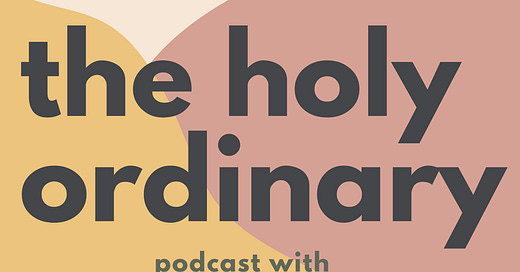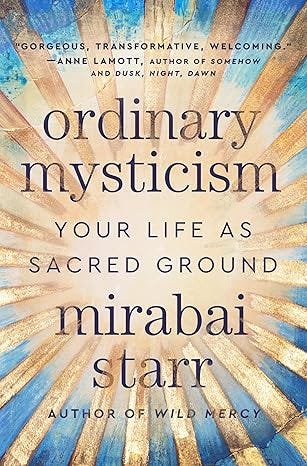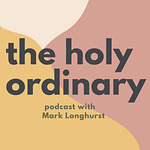Mirabai Starr has written an exquisite book entitled Ordinary Mysticism: Your Life as Sacred Ground. If you’re not familiar with her work, Starr is a beloved translator of mystics such as John of the Cross and Julian of Norwich, a writer, and co-creator of the online spiritual community Wild Heart. Like me, Mirabai Starr is deeply interested in encouraging us to awaken to the divine presence in regular life. I’m even inclined to call her book a classic. I hope you’ll listen to my conversation with Mirabai, launching what I’m calling a “pop-up podcast” to support my book The Holy Ordinary. When I can manage it, I’ll post an interview with an author, thinker, or activist whose work somehow compels us to discover the depth of God in the depth of our daily realities.
Here are three reasons why I loved Mirabai Starr’s Ordinary Mysticism so much:
1. She gives everyone permission to nurture their connection to the sacred in a way that works for them. There’s an inclusive graciousness to her writing that affirms the divine in all things, including and perhaps especially in those crevices of our lives that we de facto assumed were somehow separate from God. How do we show up to sacred reality when doing taxes, washing dishes, or stewing angrily in a traffic jam? Here are Starr’s words:
My prayer is that you will fearless look upon your life as holy and whole. That you will find meaning and wonder bubbling from the ground of your most ordinary moments—applying for a job as a barista or attending a parent-teacher conference, dating again after the end of a long marriage or pulling weeds in your urban garden… [This book] is a little bell to bring you back to yourself and remember how luminous you are—how connected and noble and miraculous.
2. Starr’s insistence on the mystical depths of the ordinary that are available to every person undercuts any hierarchy we might place between ourselves and “extraordinary” people—because extraordinary people are ordinary, too! Starr shares anecdotes of friends from all walks of life, from conscious entrepreneurs to breathworkers to compassionate economists, as a way of illuminating the transforming possibilities each of us carries. She writes: “To live as an ordinary mystic means embracing all arenas of life as doorways to the sacred, even if the soul is never overtly mentioned.” In the section “Let Your Saints *#$%! Up,” she pushes this insight further, emphasizing that the heroes and heroines of faith, such as Spanish mystic Teresa of Avila and French nun Therese of Lisieux, were not perfect people—and so we don’t need to be either:
Let’s climb up the scaffolding we built with our own hands and carry our heroes back down to earth where they belong.
—Mirabai Starr
3. Starr also profoundly understands that ordinary mysticism is connected to how we allow our pain to transform us. Ordinary mysticism is not light and love at the expense of acknowledging reality. She writes with vulnerable power about the healing potency of grief. Through sharing her own mistakes and profound losses, such as the death of her daughter, she ensures that this book is steeped in lived wisdom. Starr’s keen awareness of social injustice—when she recounts participating in a nine-and-a-half minute “die-in” as a kind of solidarity meditation to commemorate George Floyd’s murder, for example—connects ordinary mysticism to personal and collective pain. Here are several of her words on grief:
Grief is not a malady to be cured or an error to be corrected. It is a natural response to a life-altering loss. When we choose to stay present in the fire of suffering, rather than turn away, self-medicate, or try to “fix” it through “spiritual bypassing” (using beliefs and practices to check out of reality), it can become a threshold to sacred space. Our broken hearts break us open to deeper love.
I hope you enjoy our conversation, and, as always, it’s great to hear from you in the comments or by responding to this email.
P.S. Several of you have expressed interest in writing a review of The Holy Ordinary. Awesome, and thanks! I want to do a couple of posts that collect and share your thoughts (they don’t all have to be positive, either), so if you write a review on Substack or social media, tag me, and I’ll excerpt it in a Substack post. Have a great week, everyone.
Two Book Launch Events
Images Cinema, Williamstown, MA, October 22, 7pm:
Join us in the Images Lounge for an engaging conversation with local writer, film lover and former Williamstown pastor Mark Longhurst to celebrate the publication of his new book The Holy Ordinary: A Way to God. Taking inspiration from mystics, modern prophets, and saints, with surprising insights from Christian scriptures, Mark writes about mysticism as something available to everyone. Through “How to be Contemplative and Active” and “Live Green like Hildegard of Bingen,” Mark’s book speaks to each person’s need for transformation. The evening will feature a book reading, discussion, and book signing.
Registration: Space is limited and pre-registration is required.
Center for Spiritual Imagination, Online, October 24, 7pm:
You are warmly invited to join us for an engaging online conversation with Community of the Incarnation member Mark Longhurst, author of The Holy Ordinary, a new book that explores the availability of every person to a contemplative life. Co-hosted by Adam Bucko, Director of the Center for Spiritual Imagination and Kris Coleman, Program Director, this online event promises to be a space for reflection, inspiration, and community as we gather to explore the sacred in the ordinary moments of life.












Share this post